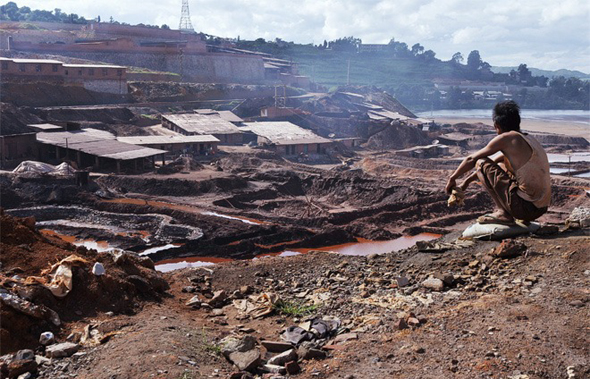Gejiu, a city pushed to the limit
- By Li Jingrong
 0 Comment(s)
0 Comment(s) Print
Print E-mail China.org.cn, April 28, 2013
E-mail China.org.cn, April 28, 2013
For generations, the local people in Gejiu, a county-level city in Honghe Hani Ethnic Minority Prefecture in southwest China's Yunnan Province, have made a living mining tin ore. The extent of their dependence on tin ore was spelled out in a recent article published on April 18 by www.infzm.com, which commented that the people's life is completely controlled by the tin ore deposits.
|
Excessive mining has wrought devastation on the area of Gejiu, Yunnan Province. |
With a total area of 1,587 square km and a population of more than 450,000, Gejiu has a proven tin reserve of over 900,000 tons, accounting for one third of the national total and one sixth of total global stock.
Since the 1980s, however, when people came in their droves, attracted by the promise of prosperity through tin ore mining, excessive mining has wrought devastation on the area: Resource exhaustion, poverty and rising crime have all brought misery to Gejiu .
A city in peril
In 1949, the Yunnan Tin Industrial Corp. was listed as one of the 156 construction projects to be undertaken with aid from the then Soviet Union and from this, the first workers' village was built in Gejiu. Since the 1950s, many such villages sprang up in this tin-producing city, resulting in ever-increasing large-scale industrialization.
According to the article, exploration of the area reached its peak in the mid 1980s when more than 100,000 workers flocked to the region. At this time, factories of all sizes were scattered over the area and direct exposed mines were "riddled with gaping wounds."
According to Huang Zhijia, publicity director for the Yunnan Tin Industrial Corp., Gejiu's surplus tin resources had disappeared by the 1990s and his company stood on the verge of bankruptcy in 1993 following consecutive years of huge losses.
The situation has been exacerbated by illicit private mining, which in Gejiu is both prevalent and violent. In 2001, more than 200,000 tons of tin ore was stolen from the Yunnan Tin Industrial Corp., resulting in loses of several hundred million yuan. In 2007, one illicit group hired nearly 100 people armed with shotguns, knives and explosives who subsequently stole a large quantity of ore. Many nearby villagers also joined in the robberies.
According to local statistics, by 2008, tin reserves in Gejiu's mining area were 10 percent less than the proven reserve, leaving the area with, at most, 5 years of maintainable reserves. In March 2008, Gejiu featured on the list of China's 12 most resource-depleted cities. By 2009, more than 30 of Gejiu's state-owned enterprises went into bankruptcy and more than 30,000 people lost their jobs.
With the bankruptcy of the tin mining enterprises and concomitant poverty, rising crime levels were not far behind. In 2008, nearly 50,000 people in Gejiu depended on the minimum subsistence guarantee provided by the government.
These were clearly desperate times. At the age of 18, Cheng Wu joined a tin ore robbery gang in 1986 and became gang leader just two years later. In 1992 Cheng was sentenced to five years imprisonment for intentional injury. In 1997 he was released from prison only to find that his old job had vanished along with the tin mining enterprises. Cheng burned through his savings before falling into drug abuse and finally contracting AIDS through using dirty needles.
Many laid-off women workers were forced into prostitution, and many contracted HIV and AIDS. Li Man, who is responsible for a local non-governmental organization which supports helpless women, said that her center had, over the past few years, arranged for the burial of 48 women who had died from AIDS.
According to a report published by the Chinese Center for Disease Control and Prevention in 2010, Gejiu was among the country's top 10 cities with the highest rate of HIV carriers.
Official response
An investigation conducted by the State Development Planning Commission in 2002 showed that, one third of China's state-owned mines built in the mid 20th century had entered "old age" and 50 of the 390 mining cities had reached the point of resource exhaustion.
Xiao Jincheng, a senior official with the State Development Planning Commission, said after his 2004 investigation and study in Gejiu that: "a place which is richer in resources is more likely to encounter problems related to development." Some economist labeled the problem "the curse of resources", which indicates that any over-dependence on a particular resource will cause social problems in a city, which will inevitably lead to resource exhaustion and the death of the city.
In 2007, the State Council published the Suggestions on Promoting the Sustainable Development of Resource-based Cities. The transformation of resource-based cities remains one of the most crucial issues facing economists.
The issue continues to be debated. The Report on the Work of the Government delivered at the annual session of the National People's Congress asserted "the acceleration of the transformation of economic development modes and the promotion of sustainable and healthy development of economy." The Plans for Adjustment and Transformation of Old Industrial Bases in the Country followed on the heels of the Report. The topic of resource exhaustion was even included in provincial civil service examination questions. With reform and social improvement constantly in people's minds, the issue of resource exhaustion and the problems it brings is likely to stay an issue of public debate for the foreseeable future.







Go to Forum >>0 Comment(s)